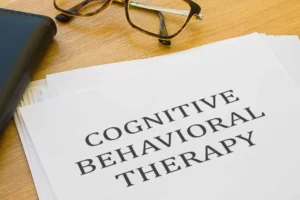Do you know someone who is struggling with addiction? If so, you may be wondering what can be done to help them. Addiction is a complex disease that requires professional treatment. One type of treatment that has been shown to be effective is cognitive behavioral therapy. In this blog post, we will discuss how cognitive behavioral therapy can help people overcome addiction.
Contents
Is CBT Good For Addicts?
 CBT is a form of therapy that can be beneficial for individuals struggling with addiction. It is a type of talk therapy and can help individuals identify unhealthy thought patterns and behaviors associated with their addiction. CBT provides the individual with strategies to manage cravings, reduce negative thoughts, and develop positive coping skills.
CBT is a form of therapy that can be beneficial for individuals struggling with addiction. It is a type of talk therapy and can help individuals identify unhealthy thought patterns and behaviors associated with their addiction. CBT provides the individual with strategies to manage cravings, reduce negative thoughts, and develop positive coping skills.
If we could simply answer “yes” or “no” when asked if CBT is good for addicts, we would have to say yes. It has been proven effective in helping many individuals struggling with addiction. And. in fact, it provides an emotional support system that can be beneficial during recovery.
Although CBT may not be the only type of therapy a recovering addict needs, it can be an important part of the recovery process. As it helps to manage cravings and reduce the chances of relapse. So, be sure to give CBT a try if you or someone you know is struggling with addiction. It could make all the difference.
What Is The Cognitive Behavioural Model Of Addiction?
Addiction is a complex behavioral disorder that is characterized by compulsive substance use. And attempts to control or stop the behavior despite adverse consequences. The cognitive-behavioral model of addiction proposes that the development and maintenance of addictive behavior are due to maladaptive cognitions (thoughts). And that leads to dysfunctional beliefs, attitudes, and behaviors.
It suggests that these maladaptive cognitions can then create a self-perpetuating cycle of addiction. In which the addicted person uses substances to cope with negative thoughts and feelings. That will be leading to further negative consequences. The cycle then repeats itself, creating a vicious cycle of dependency on substances.
The cognitive-behavioral model of addiction proposes that individuals suffering from addiction can learn to recognize and address the cognitive distortions that are maintaining their addictive behavior. By using different cognitive-behavioral techniques. Hence, let’s further explore the different techniques and methods that are used in cognitive-behavioral therapy for addiction.
What Are The Techniques Used In CBT For Addiction?
 The following are different techniques used in CBT for addiction:
The following are different techniques used in CBT for addiction:
1. Cognitive Restructuring: This is a technique that helps an individual to recognize and challenge the negative thoughts and beliefs they have about their addiction. It encourages them to develop more positive, realistic ways of thinking and behaving.
2. Self-Monitoring: This technique involves tracking one’s behaviors and reactions to certain situations. It helps individuals understand their triggers and become aware of the behavior patterns that can lead to relapse.
3. Coping Skills: Another technique involves teaching an individual how to cope with challenging cravings and urges in effective ways. It may involve relaxation strategies, mindfulness meditation, or progressive muscle relaxation.
4. Social Support: This technique emphasizes building a support network of family, friends, and professionals that can provide encouragement and help in times of need. It also involves learning how to set healthy boundaries with people who may be enabling addiction.
5. Motivational Interviewing: Finally, the effective and popular technique of motivational interviewing is often used in CBT for addiction. It helps individuals to explore and resolve any ambivalence they may have about change, while also helping them to identify their own motivations and goals.
These techniques can be beneficial when used as part of an overall treatment plan for addiction recovery. However, it is important to note that CBT is not a substitute for professional addiction treatment. It should always be used as part of an evidence-based, comprehensive program to ensure the most successful outcomes.
What To Expect From A CBT Session?
If you are someone suffering from addiction for so long. Or having a hard time dealing with anxiety or any other mental illness. Then, you might be considering going for Cognitive Behavioral Therapy (CBT). The idea of starting a conversation with someone about your mental health can be overwhelming and scary. So, here’s what the sessions may look like:
- CBT sessions start with an assessment of the presenting problem. During this, you discuss problems that are affecting your life and how they are impacting your mental health. Then, the therapist will ask questions about thoughts, feelings, and behaviors to help gain a better understanding of your current struggles.
- The therapist will then help you to identify any negative thinking patterns that could be contributing to your symptoms. This includes looking at how certain beliefs or attitudes may be affecting your behavior and moods. At this point, the therapist may suggest different techniques or skills that can help minimize any unhelpful thoughts or behaviors.
- Generally, the process is too long and can be divided into session-by-session basis. Sessions may involve talking, role-playing, relaxation and mindfulness practices, or practicing real-life situations to help with anxiety and other mental health conditions.
- At the end of each CBT session, your therapist will likely review what you discussed and discuss any homework or assignments that can help you continue to work on your goals.
CBT is not a quick fix. And it may take time before you start to notice positive changes in yourself. However, with the guidance of an experienced therapist, you can learn how to manage symptoms and find lasting relief.
What Are The Benefits Of Cognitive Behavioral Therapy For Addiction?
 If you are choosing cognitive behavioral therapy for addiction, then you may be wondering what benefits it can provide. Some of the main benefits might include:
If you are choosing cognitive behavioral therapy for addiction, then you may be wondering what benefits it can provide. Some of the main benefits might include:
1. Healthier coping strategies: By using cognitive behavioral therapy, you can learn to identify thought patterns and behaviors that lead to addiction. And develop healthier coping strategies for dealing with your issues.
2. Improved self-esteem: As you learn to address the root cause of your addiction, you may also find that it can help to boost your self-esteem as well. Improving how you feel about yourself can be an important step in overcoming addiction.
3. Improved communication skills: Cognitive behavioral therapy can also help to improve your communication skills. And that can be beneficial when dealing with relationships or other stressful situations.
4. A better understanding of yourself: Through CBT, you may gain a greater understanding of who you are and how your thoughts and emotions affect your behavior. This could help you make positive changes in your life.
5. Increased motivation: Finally, Cognitive behavioral therapy for addiction will more likely to increase your motivation. That is essential for making progress with recovery and staying sober.
Overall, it can be an effective tool for overcoming addiction and developing healthy habits that will last a lifetime. If you’re considering this type of therapy, make sure to discuss it with your doctor or mental health provider to find out if it’s right for you. With the right support, you can start making progress on your journey toward sobriety.
Are There Any Drawbacks?
Generally, therapies are safe, but there are some potential drawbacks to consider. In the same way, cognitive behavioral therapy for addiction may also include some potential drawbacks that should be taken into account. These might include:
- Feeling overwhelmed: During therapy, you may have to address difficult emotional topics and this can be overwhelming. You should talk to your therapist if you ever feel anxious or overwhelmed during a session.
- Cost: Some forms of cognitive behavioral therapy for addiction may not be covered by insurance and you might need to pay out of pocket. However, many therapists offer sliding scale fees, so it’s worth looking into this option.
- Time commitment: Cognitive behavior therapy for addiction is an ongoing process and can be time-consuming. You may need to attend multiple sessions per week, which could be challenging if you have a busy work or family schedule.
- Lack of support: Your friends and family may not understand why you are seeking therapy for addiction or they may simply be unsupportive. This could make it difficult to talk openly about your struggles with addiction and can impede the progress of your therapy.
While there are some potential drawbacks, this is often highly effective in treating addiction and other mental health disorders. The reason is its focus on identifying and addressing the underlying causes of addiction. With a good therapist and an open mind, you can use cognitive behavior therapy to effectively treat your addiction.
Conclusion
In a nutshell, cognitive behavioral therapy for addiction is thought to be effective in treating symptoms of addiction and helping individuals to maintain sobriety. It is based on the idea that our thoughts, feelings, and behaviors are all interconnected and can impact each other. Addressing thoughts and emotions, helps people recognize their triggers for substance use. Then, modify their responses to those triggers, and find healthier ways to cope.
Thus, overall, if you suffer from addiction, cognitive behavioral therapy can help. It’s a proven method of treatment that can help individuals develop better-coping mechanisms and find healthier ways to manage their addiction.
For more information, please contact MantraCare. Addiction is a chronic and often relapsing disorder characterized by compulsive drug-seeking and use despite harmful consequences. If you have any queries regarding Online Addiction Counseling experienced therapists at MantraCare can help: Book a trial Online therapy session


